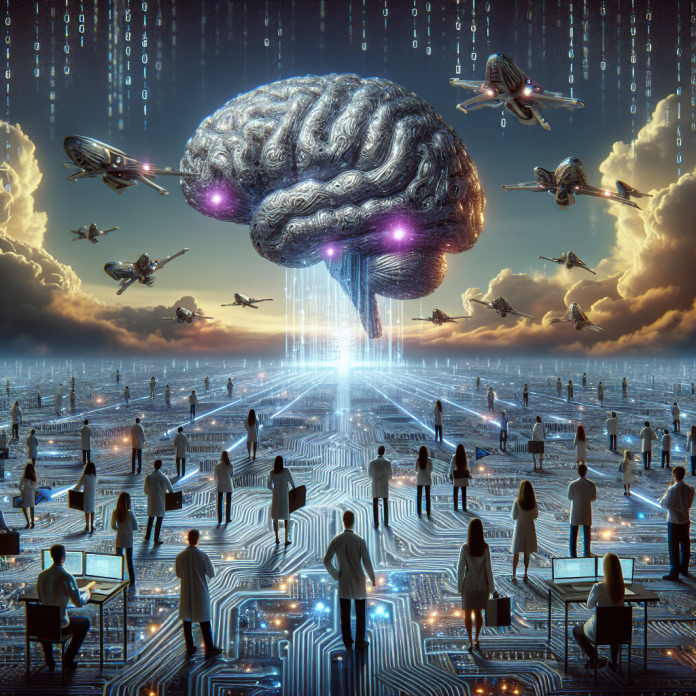The Rise of Artificial Intelligence Risks
In today’s rapidly evolving technological landscape, the widespread adoption of artificial intelligence (AI) has transformed the way we live, work, and interact with the world around us. From virtual assistants like Siri and Alexa to self-driving cars and predictive algorithms, AI has become an integral part of our daily lives. However, the increasing complexity and capabilities of AI systems also bring with them a host of potential risks and challenges that need to be carefully assessed and managed.
Assessing the risks associated with AI requires a comprehensive understanding of the technology itself, as well as a critical examination of the potential implications for society, economy, and ethics. In this article, we will explore the various risks associated with AI, from job displacement and bias in algorithms to ethical concerns and cybersecurity threats.
Job Displacement and Automation
One of the most significant risks associated with AI is the potential for job displacement and automation. As AI systems become more advanced and capable of performing tasks that were previously done by humans, there is a growing concern that many jobs may become obsolete. According to a report by McKinsey, up to 800 million workers worldwide could be displaced by automation by 2030.
For example, in the manufacturing industry, robotic arms and automated assembly lines are increasingly replacing human workers, leading to layoffs and job losses. In the retail sector, AI-powered chatbots and self-checkout systems are reducing the need for human customer service representatives and cashiers. While AI has the potential to create new jobs in areas like data science and programming, the transition may be challenging for workers in industries that are heavily reliant on manual labor.
Bias in Algorithms
Another critical risk associated with AI is the potential for bias in algorithms. AI systems are reliant on large datasets to learn and make decisions, and if these datasets are biased or incomplete, it can lead to discriminatory outcomes. For example, in the criminal justice system, AI algorithms used to predict recidivism rates have been found to exhibit racial bias, leading to harsher sentencing for people of color.
Similarly, in the hiring process, AI-powered resume screening tools have been shown to favor candidates with specific skill sets or demographics, potentially perpetuating existing inequalities in the workforce. As AI becomes more ingrained in decision-making processes across various sectors, it is essential to address issues of bias and ensure that algorithms are fair and transparent.
Ethical Concerns
Ethical concerns surrounding AI are also a significant area of risk that needs to be carefully assessed. As AI systems become more sophisticated and autonomous, questions arise about the implications for privacy, consent, and accountability. For example, in the healthcare industry, AI-powered diagnostic tools raise concerns about patient confidentiality and the potential misuse of sensitive medical data.
Additionally, the development of autonomous weapons systems, known as “killer robots,” raises ethical questions about the morality and legality of delegating life-and-death decisions to machines. As AI technologies continue to advance, it is crucial to establish clear guidelines and regulations to ensure that ethical principles are upheld and that AI systems are used responsibly.
Cybersecurity Threats
Cybersecurity threats pose another significant risk to AI systems, as they are increasingly being targeted by malicious actors seeking to exploit vulnerabilities for their gain. AI systems are vulnerable to attacks such as data poisoning, where malicious actors manipulate training data to produce incorrect or biased outcomes, or adversarial attacks, where subtle changes to input data can fool AI algorithms into making incorrect predictions.
For example, self-driving cars equipped with AI systems are vulnerable to attacks that could manipulate their sensors and cause accidents. AI-powered financial trading platforms are at risk of manipulation by hackers seeking to disrupt markets or profit from insider trading. As AI becomes more integrated into critical infrastructure and decision-making processes, it is essential to invest in robust cybersecurity measures to protect against potential threats.
Managing AI Risks
Despite the potential risks associated with AI, there are steps that can be taken to assess and manage these challenges effectively. One approach is to prioritize transparency and accountability in the development and deployment of AI systems, ensuring that algorithms are designed ethically and that decisions made by AI can be explained and justified.
Additionally, investing in diversity and inclusion in AI research and development can help mitigate bias in algorithms and ensure that AI systems are representative of diverse perspectives and experiences. Establishing clear regulations and guidelines for the responsible use of AI can also help address ethical concerns and ensure that AI technologies are deployed in a way that benefits society as a whole.
In conclusion, the rise of artificial intelligence presents numerous risks and challenges that need to be carefully assessed and managed. From job displacement and bias in algorithms to ethical concerns and cybersecurity threats, it is essential to understand the potential implications of AI and take proactive steps to address these risks. By prioritizing transparency, accountability, and inclusivity in the development of AI systems, we can ensure that AI technologies benefit society while minimizing the negative impacts on individuals and communities.

